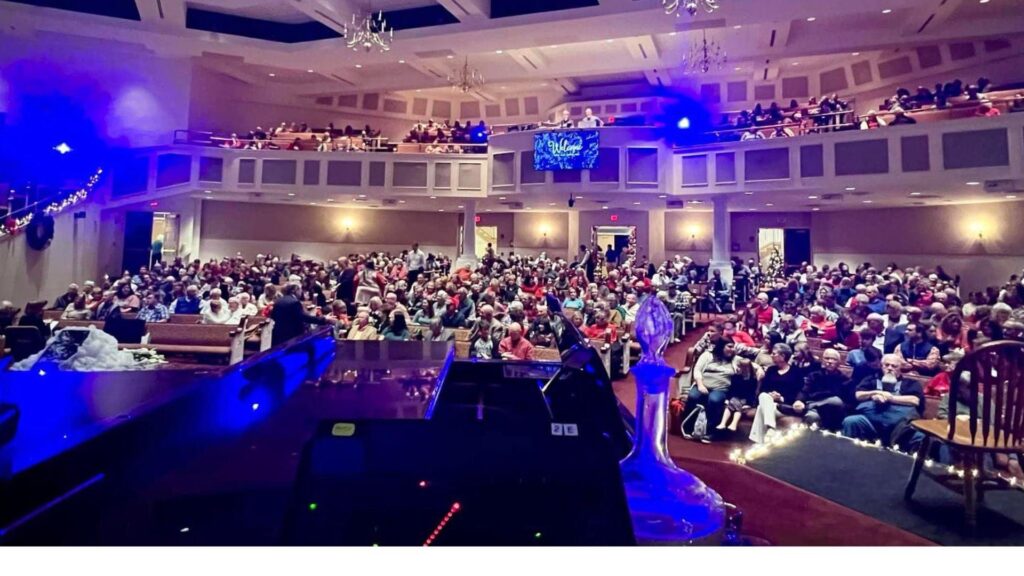“Worship is the missing jewel of the church.”
A.W. Tozer
Tozer was right: worship often is an element in church that is misplaced, overlooked, but immeasurably valuable. We have focused on just about everything else, except worship. We have strategies galore for church growth, witnessing, and building campaigns; so much so that it’s become impossible to keep up with the latest one. But in the midst of the enlightenment provided by book and seminars, worship has remained a troubling and divisive issue for many congregations.
For example, I tried making a list of all the different styles of worship I’ve heard of in recent years:
“Seeker-sensitive”
“Seeker-driven”
“Gen-X worship”
“Ancient future”
“Contemporary”
“Blended”
“Traditional” or “Classic worship”
For most of us to choose a worship style would be like a farmer who stumbles into a Starbuck’s looking for a simple cup of coffee. Just a list of the options is confusing enough to make you swear off lattes for life!
Some pastors are confused by all the options, and the confusion is no accident. I believe that our enemy has hijacked the topic, and fooled us into making secondary issues the main thing. We are focusing all our attention on style, yet style is not what matters most.
STYLE IS SECONDARY
I am not saying that style of worship is unimportant, because what style of music you use will determine what kind of people you will reach…or if you reach them at all. It will affect how easily your congregation enters into personal worship, because the musical style must be accessible to them most of the time. The same way you would have difficulty singing along with songs written in a foreign language, musical styles are languages that speak to some people and not to others. Music is one of the tools that the worshipper is using to make contact with God, so you need to pick the right tools for the job.
But the real issue is not style, because God’s heart desire is not for any particular style of music. Contrary to what your college music professors may have thought, God is not concerned with whether the music is “high-brow” or “low-brow”. God is just as satisfied being worshipped through country music classical, liturgical as well as Latin Salsa. In fact, from the descriptions of worship in the Psalms, Salsa may be closer than classical to what the ancient Hebrews used for worship.
Let me be clear: there is no “spiritual” style of worship. All styles of music are man-made and spiritually neutral. What makes them “Christian” are the words you apply to the melodies. That’s why we’ve seen nearly all styles of music be used by Christian artists in the past decades. But while Christian rap is a perfectly acceptable way for people to glorify God, using it for worship in most churches (even in urban churches) would be problematic, for several reasons. First, because it is on the extreme edge of musical styles with only a limited segment of the population who respond to it positively.
The other problem with Christian rap being used in worship is ironically the same problem with using classical music. Both styles discourage congregational participation. The rhythmic difficulty of rap and the complexity of reading classical both prohibit the involvement of the casual listener. And that leads to what I believe is God’s core problem with worship in this era.
The real concern of God’s heart is the lack of participation, preparation, and priority of worship in our churches.
You see, worship is meant to please God. Our personal enjoyment of it is not the primary goal! Self-centered creatures that we are, we have taken something that was meant for His pleasure and made it all about us. And as long as we frame the debate over worship within the boundaries of style, we will never answer the main question about worship:
What does God desire from our worship?
HOW CAN YOU TELL WHEN THE WORSHIP LEADER IS WORSHIPPING?
The old joke goes, “How can you tell when a politician is lying?” The answer: “When his lips are moving!” (Drum rim shot: “bah dump dum”)
But in church, you shouldn’t take it for granted that those of us on the platform are truly worshipping, just because our lips are moving. Jesus Himself said that the Father is looking for true worshippers who would worship Him in spirit and in truth. But before your church can become a worshipping church, the leaders of the church must first be true worshippers.
So if you are a pastor, music minister, vocalist or band member, you cannot lead your congregation into worship unless you yourself are worshipping.
While that may seem too obvious of a statement to bother with, the truth is that worship leaders are often so caught up in the mechanics of leading worship that having their own worship experience with the Father gets pushed to the back burner. I’ve known pastor’s who spend the first half of the service fumbling through their sermon notes, and worship leaders who are more concerned with how their hair looks than how their heart looks to God. Sometimes worshipping God for themselves can be the last thing on a long list of priorities.
As a leader in your congregation, Satan will make it especially hard for you to personally enter into worship during most regular church services. So for worship to take place, you must be proactive in preparing your own heart and life to enter the Father’s presence. Here’s one of the main hindrances to worship many worship leaders face on Sunday…
How’s your prayer life?
For you to be a true worshipper, you must cultivate a daily time with God. Perhaps this sounds elementary to you, but the truth it’s easy for all of us, including pastors and worship leaders, to become slack in our own personal worship and prayer with the Lord. And while you don’t want a “quiet time” to become just a legalistic observance, you can’t expect worshipping to come naturally in front of others if it has not been a daily habit done privately before the Lord.
You can’t perform on Sunday what you don’t practice on Monday.
I’ve noticed that a congregation will respond to the passion that is evidenced in the leader’s own worship. As a leader, if you do not have that honest passion, you can either try to fake it or you can let it lay there like a wet blanket. But neither of those will help your congregation to worship. And their worship is what invites the power of the Holy Spirit to your services.
Though you may be able to impress people with vocal pyrotechnics, and you may put on the habits of expressive worship (lifting hands, clapping, etc.), the anointing of God will only come when the vessel is pure and passionate. And without the reality of a vibrant daily walk with the Lord, you will be singing about a Love who is only a faint memory. And that leads me to my next question…
How honest are you when leading worship?
Sincerity and authenticity in worship are musts for the worship leader. True worship is something you cannot fake (though many try). It will be real if your heart is in tune with God. It will be powerless and fake if your fellowship with God is distant because you lack time spent with Him.
But as you know, that kind of spiritual discipline is hard. So too often, worship leaders just settle for “looking like” they are worshipping. As a result, I’ve seen the strangest habits on the platforms of churches across the country. Pastors and music ministers alike adopt affected ways of speaking and gesturing that they believe convey polish and culture. But often, these actually betray a false showmanship and patronizing attitude toward the congregation.
For example, I remember one church where everyone on the platform was instructed to use the phrase, “Please turn your attention to the screens”. We were also told, “Please turn your attention to the baptistery area” or “Please turn your attention to this week’s bulletin”. They were not allowed to simply say “Let’s all look at the screen”.
Tell me, does anybody really talk like that?
If you are riding in the car with your wife driving, and another car starts barreling straight toward you at a high rate of speed, do you say to your wife, “Honey, please turn your attention to the vehicle that is about to broadside our automobile”? If not, then why do we think that we need to use formal terminology and speak in code from our pulpits?
This kind of artifice cues the congregation that what is happening is scripted and unnatural. Some ministers even talk with a different pitch of voice on the platform than privately. Also, I watched a guy leading worship on TV once whom I could tell had choreographed all his hand motions to coincide specifically with the words of the song he was leading. When they sang about heaven, he smoothly pointed upward, and when they sang about Jesus in their hearts, he elegantly put his hand over his chest. What that subliminally conveys to a normal congregation is a lack of sincerity on the leader’s part.
Artifice (“that which is artificial”) is the kryptonite of real worship. I understand “performance” better than most worship leaders. I’ve spent a great deal of time doing musical theatre. It is one of my loves. But when I step on a church platform, I try to crucify as much of that performance mentality as possible. Though I do want to sing and play nicely, my ultimate goal is to be a worshipper in the midst of the congregation. So I actively avoid anything that is too telegraphed or scripted.
While no one wants to be awkward in their worship leading, we must avoid even stronger the temptation to choreograph everything we do on the platform. Even when worship is well prepared, it must come from the heart and avoid pretense or performance.
Third, how prepared are the “mechanics” of your music?
Speaking of preparation, as much as we’d like people to think that we just show up and worship happens due to our intense spirituality, there’s actually a great deal of work beforehand that goes into a weekly service. Even once you’ve picked out all the songs and rehearsed all the musicians and vocalists, the amount of personal preparation by the worship leader and pastor can still determine how effectively they will be able to enter into worship.
For instance, are their “speed bumps” in your worship service? Those are the times when everything stops flowing smoothly along, and people feel like something is not right. It may be when there is a “pregnant pause” in the proceedings while you are waiting for someone to make his way to the platform, or for the instrumentalists to figure out what song comes next. It may be when the slides on the screen don’t match the words you’re singing. It may be when you move suddenly from a contemplative song into a jarringly uptempo number.
The most well-known cause for worship speed bumps is sound system malfunction. But often these problems are due more to a lack of proper preparation. We probably owe an apology to all the demons we’ve blamed, when it was really people who are at fault!
Whatever the cause, the “speed bumps” break the congregation’s concentration upon the Lord, and it makes the worship leader start scrambling to fix things. And this can cause us to quickly get out of the Spirit and into the flesh.
You guard against this by planning ahead of time how the songs will flow into each other, placing songs with similar tempos in groups together. Do you need to transition into the next song with a short prayer, or a thought that will communicate the song’s meaning to the worshipper? It also helps to think about the logistics of people moving into place for the next part of the service. Do you need to keep talking while motioning the next guy to the platform? These kinds of concerns may seem petty, but without planning we can get flustered in the process of worship and miss the blessing that everyone else is receiving.
One of my biggest flubs was in leading the hymn “Since Jesus Came Into My Heart” one Sunday. I had put a cute little gospel shuffle on it, and we were happily booking right along when it came time to move to the next verse. Being a conscientious worship leader, I decided at the end of the chorus to call out the first two words of the next verse we would be singing, just to make sure everyone was cued to what was about to happen. So I put a big smile on my face, and blurted out with great gusto, “I’m possessed!” (the verse goes, “I’m possessed of a hope that is steadfast and sure…”). While it flew past some people, my praise team was especially delighted that I had finally admitted to the whole congregation what they had known about me all along!
The interesting thing is that proper preparation allows you the freedom to be spontaneous at times in the service. Preparation is not the enemy of spontaneity, it is the pathway for it! When my service is well constructed ahead of time, I can feel comfortable shifting in a different direction, adding a well known chorus or part of a hymn when the Spirit leads. Also, I can choose to completely skip a song and instead focus on a season of prayer for the congregation.
The ability to move with agility through prepared worship and spontaneous response to the Holy Spirit is why they call us “Worship Leaders”. We are to listen to the Spirit, both in the week prior to the worship as well as on the platform during worship.
Here’s my last question about your personal worship: what do you do when you’re in a bad mood but you have to lead worship?
Everybody has bad days: times when you are down, distracted by a family issue, or just plain not feeling good. And because you are on the worship team, it’s not as if you can stay home and curl up with a bag of Cheetos on the couch. It’s never ok to be a downer when you lead just because you’re “not feeling it” today.
If you are thinking of worship leading as “performing”, then you’ll probably paste on a happy-face and go out their and “sell it” like a trouper. But since worshipping should be sincere, does that mean that you subject the congregation to your moodiness? Do you lead songs with a heavy sigh and an attitude of detachment? Do you have the worship team dress as members of the Titanic’s crew, while singing “Nearer My God To Thee” as they slowly sink behind the choir loft railing?
The correct answer is: “none of the above” (the Titanic costumes would get a little expensive anyway). Some of the purest praise is worship that has been refined through trials. And when God asked us to offer Him the “sacrifice of praise”, I think He was referring specifically to this kind of day when we aren’t naturally “happy”. Our lives may be painful at the time, but God is still worthy of our praise. Our hearts may be breaking, but they still belong to Him and were paid for with His blood. So when we are feeling low, that’s when it truly is a “sacrifice” for us to praise Him… when we are in the midst of the pain. In spite of all the hurt… we say, “Praise the Lord, anyhow”!
I love worship anytime, but it means so much more to me when I look out at the congregation and see someone who I know may be fighting cancer, yet their voices are lifted in praise just the same. I see someone whose spouse has just left them, but their hands are raised in surrender to the Lord of their destiny. When you see someone who is worshipping in the midst of those circumstances, they are not faking it, they are “faith-ing it”. They have made the decision that God is more worthy of their attention than are their problems. And when they start to worship “in spite of it all”, they begin to see things from God’s point of view instead of their own limited perspective.
Sometimes it’s hard to worship freely when people around you are resistant to expressiveness in worship. I’ve found it is so hard not to let my worship be affected by how others view my worship. But when I feel awkward, I try to remember the woman with the alabaster box. She had burst into a stranger’s home in the middle of their supper. She had taken a prized possession and cracked it open (breaking the alabaster jar was the only way to access the perfume inside.
So she worshipped freely in the midst of opposition, offering something that came at such a great price. That kind of self-sacrificial worship is something I believe delights the Father. Like the perfume in that alabaster jar, our worship in the midst of pain is held deeply precious to him.
These practical elements of worship, prayerful preparation, sincerity of heart, musical preparation, and perseverance in the face of obstacles are essential to real worship. Anything less, and you are just “practically worshipping”.




